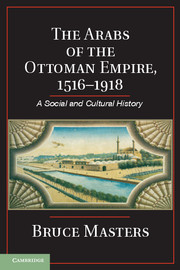Book contents
- Frontmatter
- Contents
- Acknowledgments
- Abbreviations
- Note on Transliteration
- Introduction
- 1 The Establishment and Survival of Ottoman Rule in the Arab Lands, 1516–1798
- 2 Institutions of Ottoman Rule
- 3 Economy and Society in the Early Modern Era
- 4 A World of Scholars and Saints
- 5 The Empire at War
- 6 The Tanzimat and the Time of Re-Ottomanization
- 7 The End of the Relationship
- Conclusion For the Faith and State
- Bibliography
- Index
- References
2 - Institutions of Ottoman Rule
Published online by Cambridge University Press: 05 April 2013
- Frontmatter
- Contents
- Acknowledgments
- Abbreviations
- Note on Transliteration
- Introduction
- 1 The Establishment and Survival of Ottoman Rule in the Arab Lands, 1516–1798
- 2 Institutions of Ottoman Rule
- 3 Economy and Society in the Early Modern Era
- 4 A World of Scholars and Saints
- 5 The Empire at War
- 6 The Tanzimat and the Time of Re-Ottomanization
- 7 The End of the Relationship
- Conclusion For the Faith and State
- Bibliography
- Index
- References
Summary
The janissaries entered Syria in 1516 as the shock troops of an empire that had undergone two centuries of political evolution. In that regard, the Ottomans were unique among the various non-Arab dynasties that succeeded in seizing power in the Arab lands beginning in the tenth century as the Abbasid caliphate went into its long decline. The slave soldiers and tribal leaders who established the dynasties that ruled from Morocco to Iraq in the transitional centuries between the “classical age” of Islam and the early modern period were typically illiterate, with no experience in governing states with a bureaucratic tradition. Often alien to the culture of the cities they seized, the self-styled sultans were content to co-opt the Arabic-speaking religious elite to serve as the public face of their regimes. The arrival of the Ottomans challenged that monopoly of knowledge exercised by local scholars, whose position was eclipsed by bureaucrats who took their orders from Istanbul. Faced with a profound shift in the geographical locus of political power, the scholarly elite in Cairo, Damascus, and Baghdad had to be content with provincial rather than imperial horizons.
The imposition of Ottoman institutions on the Arab provinces required the local Sunni Arabic-speaking elites to mediate a place within the sultan’s regime. The Ottomans made few concessions to adapt their rule to conditions preexisting in the Arab lands, other than to stress the commonality of their faith in Islam with that of most of their Arab subjects. The Ottoman officials who governed them spoke a language that was largely incomprehensible to the Arabs they ruled, but Islam provided a common political rhetoric both rulers and subjects could understand. In retrospect, an appeal to a common faith was the cornerstone of their relationship. Sunni Muslims came to accept that their status within the empire was secure and they viewed its institutions as their own, with varying degrees of enthusiasm. Chief among those was the institution of the sultanate.
- Type
- Chapter
- Information
- The Arabs of the Ottoman Empire, 1516–1918A Social and Cultural History, pp. 48 - 72Publisher: Cambridge University PressPrint publication year: 2013



